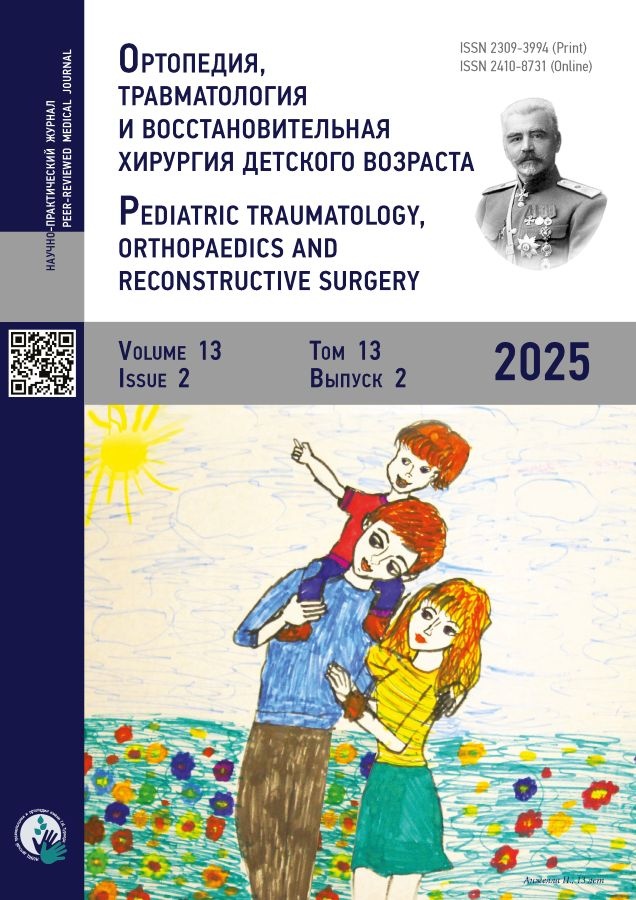重度胸段青少年特发性脊柱侧凸患者的矢状位平衡参数评估
- 作者: Vissarionov S.V.1, Rybinskikh T.S.1, Asadulaev M.S.1, Kokushin D.N.1, Belyanchikov S.M.1, Toria V.G.1
-
隶属关系:
- H. Turner National Medical Research Center for Сhildren’s Orthopedics and Trauma Surgery
- 期: 卷 13, 编号 2 (2025)
- 页面: 128-137
- 栏目: Clinical studies
- ##submission.dateSubmitted##: 24.04.2025
- ##submission.dateAccepted##: 06.06.2025
- ##submission.datePublished##: 23.06.2025
- URL: https://journals.eco-vector.com/turner/article/view/678872
- DOI: https://doi.org/10.17816/PTORS678872
- EDN: https://elibrary.ru/OPGKZG
- ID: 678872
如何引用文章
详细
论证。近年来,矢状位平衡的概念在不同病因所致脊柱畸形患者的治疗中愈发重要。关于特发性脊柱侧凸患者矢状位平衡参数的研究多为零散个例,且很少纳入重度患者。
目的:评估重度胸段特发性脊柱侧凸青少年患者的整体及区域性矢状位平衡参数。
材料与方法。纳入45例12–17岁的青少年胸段特发性脊柱侧凸患者(Lenke分型为第1、2、3型),主弯 Cobb角范围为80°至150°。所有患者均接受X线检查,评估其区域性和整体矢状位平衡参数及冠状面脊柱畸形特征。根据整体矢状位平衡参数的数值将患者分为两组。所得数据接受了描述性、 相关性、回归和比较性统计分析。
结果。冠状面脊柱畸形程度与胸椎后凸角之间存在正相关。回归分析显示,当主弯角度超过约100°时, 胸椎后凸角往往超过60°。胸椎后凸角(thoracic kyphosis)的增大是该类患者矢状面畸形的主要表现,但无论是胸椎后凸角还是冠状面主弯角度,与任何整体矢状位平衡指标均无统计学显著相关。 矢状位平衡参数更多地与脊柱-骨盆参数(PI、PT、SS、LL、PI–LL)相关。
结论。在手术治疗重度特发性脊柱侧凸时,必须考虑采用对后凸成分具有矫正效果的矫形方法。 即便在主弯角度极大的情况下,胸段特发性脊柱侧凸患者也不典型地表现出明显的前方矢状位失衡。其主要风险因素包括较低的PI和LL值。该类患者所呈现出的相关性机制目前尚未被完全阐明。
全文:
作者简介
Sergei V. Vissarionov
H. Turner National Medical Research Center for Сhildren’s Orthopedics and Trauma Surgery
Email: vissarionovs@gmail.com
ORCID iD: 0000-0003-4235-5048
SPIN 代码: 7125-4930
MD, PhD, Dr. Sci. (Medicine), Professor, Corresponding Member of RAS
俄罗斯联邦, 64–68 Parkovaya st., Pushkin, Saint Petersburg, 196603Timofey S. Rybinskikh
H. Turner National Medical Research Center for Сhildren’s Orthopedics and Trauma Surgery
编辑信件的主要联系方式.
Email: timofey1999r@gmail.com
ORCID iD: 0000-0002-4180-5353
SPIN 代码: 7739-4321
MD
俄罗斯联邦, 64–68 Parkovaya st., Pushkin, Saint Petersburg, 196603Marat S. Asadulaev
H. Turner National Medical Research Center for Сhildren’s Orthopedics and Trauma Surgery
Email: marat.asadulaev@yandex.ru
ORCID iD: 0000-0002-1768-2402
SPIN 代码: 3336-8996
MD, PhD, Cand. Sci. (Medicine)
俄罗斯联邦, 64–68 Parkovaya st., Pushkin, Saint Petersburg, 196603Dmitriy N. Kokushin
H. Turner National Medical Research Center for Сhildren’s Orthopedics and Trauma Surgery
Email: partgerm@yandex.ru
ORCID iD: 0000-0002-2510-7213
SPIN 代码: 9071-4853
MD, PhD, Cand. Sci. (Medicine)
俄罗斯联邦, 64–68 Parkovaya st., Pushkin, Saint Petersburg, 196603Sergei M. Belyanchikov
H. Turner National Medical Research Center for Сhildren’s Orthopedics and Trauma Surgery
Email: beljanchikov@list.ru
ORCID iD: 0000-0002-7464-1244
SPIN 代码: 9953-5500
MD, PhD, Cand. Sci. (Medicine)
俄罗斯联邦, 64–68 Parkovaya st., Pushkin, Saint Petersburg, 196603Vakhtang G. Toria
H. Turner National Medical Research Center for Сhildren’s Orthopedics and Trauma Surgery
Email: vakdiss@yandex.ru
ORCID iD: 0000-0002-2056-9726
SPIN 代码: 1797-5031
MD
俄罗斯联邦, 64–68 Parkovaya st., Pushkin, Saint Petersburg, 196603参考
- Mak T, Cheung PWH, Zhang T, Cheung JPY. Patterns of coronal and sagittal deformities in adolescent idiopathic scoliosis. BMC Musculoskelet Disord. 2021;22(1):44. doi: 10.1186/s12891-020-03937-4 EDN: JBOGTR
- Mac-Thiong JM, Roussouly P, Berthonnaud E, et al. Sagittal parameters of global spinal balance: normative values from a prospective cohort of seven hundred nine Caucasian asymptomatic adults. Spine (Phila Pa 1976). 2010;35(22):E1193–E1198. doi: 10.1097/BRS.0b013e3181e50808
- Ilharreborde B. Sagittal balance and idiopathic scoliosis: does final sagittal alignment influence outcomes, degeneration rate or failure rate? Eur Spine J. 2018;27(Suppl 1):48–58. doi: 10.1007/s00586-018-5472-9 EDN: TRFSLH
- Gutman G, Labelle H, Barchi S, et al. Normal sagittal parameters of global spinal balance in children and adolescents: a prospective study of 646 asymptomatic subjects. Eur Spine J. 2016;25(11):3650–3657. doi: 10.1007/s00586-016-4665-3 EDN: MCKALN
- Mac-Thiong JM, Labelle H, Roussouly P. Pediatric sagittal alignment. Eur Spine J. 2011;20(Suppl 5):586–590. doi: 10.1007/s00586-011-1925-0 EDN: WCHDCK
- Belozerov VV, Peleganchuk AV, Mikhailovsky MV. The effect of surgical correction of lenke types I and III scoliotic deformities on the spinal balance in patients aged 15-35 years. Spine Surgery. 2023;20(3):16–25. doi: 10.14531/ss2023.3.16-25 EDN: ZCBTGE
- Roussouly P, Labelle H, Rouissi J, et al. Pre- and post-operative sagittal balance in idiopathic scoliosis: a comparison over the ages of two cohorts of 132 adolescents and 52 adults. Eur Spine J. 2013;22(Suppl 2):S203–S215. doi: 10.1007/s00586-012-2571-x
- Vissarionov SV, Drozdetsky AP, Kokushin DN, et al. Correction of idiopathic scoliosis under 3d-ct navigation in children. Spine Surgery. 2012;(2):30–36. doi: 10.14531/ss2012.2.30-36 EDN: OYSNAF
- Abelin-Genevois K, Estivalezes E, Briot J, et al. Spino-pelvic alignment influences disc hydration properties after AIS surgery: a prospective MRI-based study. Eur Spine J. 2015;24(6):1183–1190. doi: 10.1007/s00586-015-3875-4 EDN: ATLSSM
- Kandwal P, Vijayaraghavan GP, Nagaraja UB, et al. Severe rigid scoliosis: review of management strategies and role of spinal osteotomies. Asian Spine J. 2017;11(3):494–503. doi: 10.4184/asj.2017.11.3.494
- Grabala P, Gregorczyk J, Fani N, et al. Surgical treatment strategies for severe and neglected spinal deformities in children and adolescents without the use of radical three-column osteotomies. J Clin Med. 2024;13(16):4824. doi: 10.3390/jcm13164824 EDN: RYNGOB
- Dickson RA, Lawton JO, Archer IA, et al. The pathogenesis of idiopathic scoliosis. Biplanar spinal asymmetry. J Bone Joint Surg Br. 1984;66(1):8–15. doi: 10.1302/0301-620X.66B1.6693483
- Vissarionov SV, Kokushin DN, Belyanchikov SM, et al. Surgical treatment of children with idiopathic scoliosis of lenke type I with the use of total transpedicular fixation. Pediatric Traumatology, Orthopaedics and Reconstructive Surgery. 2014;2(2):3–8. doi: 10.17816/PTORS223-8 EDN: ORTWLB
- Grabala P, Helenius IJ. Clinical and radiological outcomes of less invasive temporary internal distraction followed by staged pedicle screw instrumentation in adolescents with severe idiopathic scoliosis at 2-year minimum follow-up. World Neurosurg. 2020;143:e464–e473. doi: 10.1016/j.wneu.2020.07.183 EDN: QLQSLV
- Mikhailovsky MV. Long-term results of surgery for idiopathic scoliosis in adolescents: a meta-analysis. Spine Surgery. 2016;13(4):28–39. doi: 10.14531/ss2016.4.28-39 EDN: XBKHDF
- Stone LE, Newton PO, Catanzano AA Jr, et al. Severe (>100 Degrees) thoracic adolescent idiopathic scoliosis - a comparison of surgical approaches. Global Spine J. 2025;15(3):1773–1782. doi: 10.1177/21925682241264768 EDN: VKGUZV
- Dubousset J. Biomechanical and clinical comments about the anterior approach for the surgical treatment of kyphosis and kyphoscoliosis in children and adolescent. Spine Surgery. 2010;(1):18–28. doi: 10.14531/ss2010.1.18-28 EDN: LPAQKR
- Ma Q, Wang L, Zhao L, et al. Coronal balance vs. sagittal profile in adolescent idiopathic scoliosis, are they correlated? Front Pediatr. 2020;7:523. doi: 10.3389/fped.2019.00523 EDN: ITZQGV
- Barrey C, Roussouly P, Le Huec JC, et al. Compensatory mechanisms contributing to keep the sagittal balance of the spine. Eur Spine J. 2013;22(Suppl 6):S834–S841. doi: 10.1007/s00586-013-3030-z EDN: ORZVDV
- Slattery C, Verma K. Classification in brief: SRS-Schwab classification of adult spinal deformity. Clin Orthop Relat Res. 2018;476(9):1890–1894. doi: 10.1007/s11999.0000000000000264
- Vissarionov SV, Kokushin DN, Drozdetsky AP, et al. The 3d-ct navigation technology for surgical treatment of children with idiopathic scoliosis. Spine Surgery. 2012;(1):41–47. doi: 10.14531/ss2012.1.41-47 EDN: OUHHGP
- Vissarionov SV, Belyanchikov SM, Kokushin DN, et al. Results of spinal deformity correction using transpedicular instrumentation in children with idiopathic scoliosis. Spine Surgery. 2013;(3):30–37. doi: 10.14531/ss2013.3.30-37 EDN: QOYSKR
补充文件









